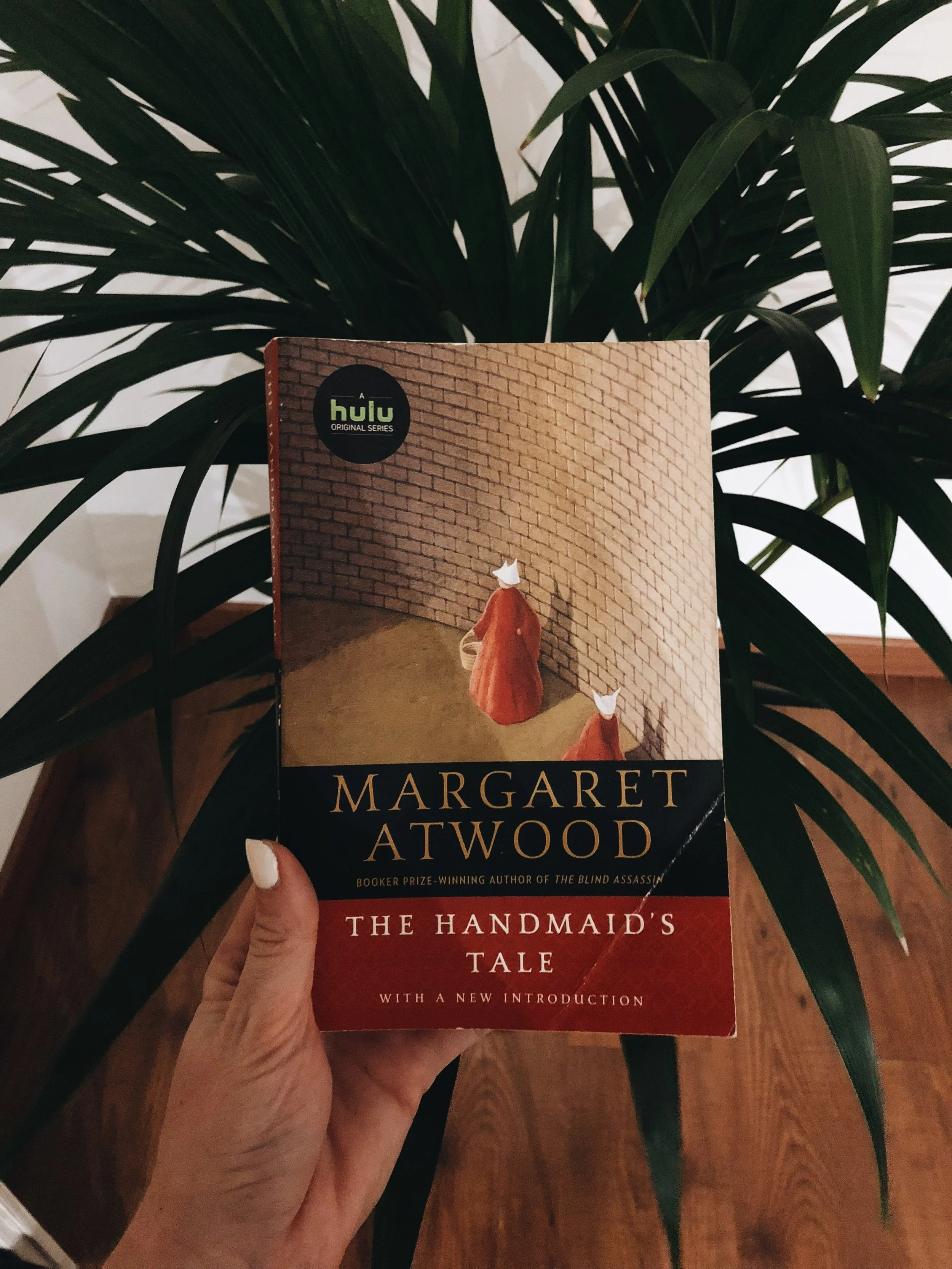REVIEW OF "THE HANDMAID'S TALE"
The Handmaid’s Tale was a difficult read for quite a few reasons, so I will begin with the most evident. This was the first time I have read anything written by Margaret Atwood, so I cannot testify to it being her consistent writing style, but it was unlike anything I’ve read before. Highly metaphorical and analogical, she was able to make extremity and unimaginable suffering seem as though it was right around the corner, right in your kitchen, right in your closet, right in your government. The choppiness somehow flowed well within the story, as it wasn’t a perfunctory choppiness but a descriptive and concise one, much like the true thought process of any one person. I found myself reading sentences and paragraphs two and three times, not because I was forgetting to pay attention, but because they were multi-dimensional, and I was starving to understand every single angle of her language. Within her tiny and concise sentences, it felt as though nothing was missing and nothing was excess. You could taste the eggs, smell the daffodils, feel the stale air.
There were times when you wished you couldn’t.
The story and the unmistakably specific way it is told brings you in. It captures you, freezes you, somehow forces you to continue as if reading it can somehow make it stop. You feel powerful and—simultaneously, if you are a woman—powerless, like you can somehow save Offred only if you continue reading.
And isn’t that the point?
Atwood effectively shows you how powerful you are and how easily that power can be stolen with no weapon other than your own apathy. In her words, “when power is scarce, a little of it is tempting.” And tempt you she does. Atwood pushes you to the edge, leaving you staring out into the horizon long after the pages are shut, feeling the pounding of your heart shift outward, desperately wanting to use it like the grenade it was made to be against the theocratic totalitarianism of Gilead.
Though Atwood’s highly significant and never scant writing could be perceived as “preachy” in any other pretense, her first-person perspective keeps it from feeling so. Offred’s perspective of her own tortured existence—and an often achingly confused perspective at that—gives the reader a sense of honesty rather than sermonizing, transparency rather than pious morality.
Offred’s prayer within the pages of this book zooms out to the spiritual scope of the entire story, with its honest pleas for the ability to believe, to understand. As she prays to the God that the people of Gilead have perverted and attempted to control and credit as the purpose of all their evil, her struggle to know what is true is evidenced and you find yourself aching to reach out to her, shout through the pages that she is not alone, she is not wrong, and lies and truth are easily confused when you can stamp the name of God on either and call it His.
And this is exactly the brand of suffering that makes Offred a spectacular heroine: her brazen lack of heroics. She is relatable in her paralyzing fear and her nearly perfect (but not entirely undistracted) obedience. Offred is Every Woman. Her few small acts of rebellion are easily quieted by fear and she is humanized by this lack of fearless wildness. But, nonetheless, she remains a hero in her mere survival and refusal to give herself entirely over to this broken and dying society. She remains a hero by controlling what tiny aspect of her sexuality she can, and we realize that our control over our own bodies, our own sexuality, is our very most human power and treasure.
Yet Offred—as well as the rest of America’s womankind—are stripped of that control, that freedom, that power. And when you read this story, you will become so immersed that you will feel as though you have lost it as well. This often hard to stomach fiction is precisely that way because of the certainty and finality with which Atwood weaves the story. It is cautionary only because, while amidst the characters and their utopian Gilead, you feel as though you are suffocating alongside the handmaids. You feel as though you must escape. You feel as though reading this haunting narrative is somehow disrespectful to the women and men of the story, but that not reading it is choosing to turn a blind eye and therefore a condoning eye to the parallel suffering within reality. Atwood is telling an important story, no matter that it is fictional. Any reader knows that sometimes the most important stories are the fictional ones. As you find yourself among the pages you, like Offred, will begin to “feel like the word shatter.”
Amidst all this painfulness are small glimpses of the gorgeousness of life. When you begin to feel most burdened by the story, Atwood offers you a small look at the beauty that makes this world one worth living in. Offred herself knows that a human can’t survive without some hope, which in this book, typically takes the shape of flowers and old love. So, if it all feels too daunting, have hope that Offred “tried to put some of the good things in as well. Flowers, for instance, because where would we be without them?”
If you aren’t a heavy reader but you try to ingest a few books every year, let this be the next one you pick up. If you find yourself devouring stories often, stop what you are doing and read this now. And if you can’t be made to read for anything, download Hulu and watch their quite accurate version of the story. But whatever you do, consume it. The only way to stop the evil contained in these pages from seeping out is to see how precariously we balance above it. Because, as Offred says herself, “freedom, like everything else, is relative.”
-LR

